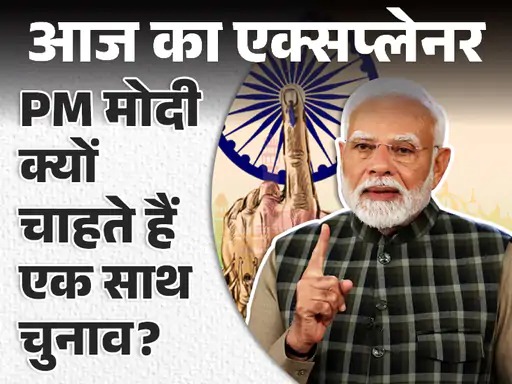
The first elections of independent India were held in 1951-52. At that time, elections for Lok Sabha and state assemblies were held simultaneously. This tradition continued until 1957, 1962 and 1967. But in 1969, due to political instability, the government of Chief Minister Bhola Paswan Shastri in Bihar fell, and the assembly was dissolved. In 1970, Prime Minister Indira Gandhi also conducted Lok Sabha elections 11 months ahead of schedule. After this, the schedule of Lok Sabha and Assembly elections became different.
Now news is coming that The tradition of ‘One Nation One Election’ may start once again in 2029. The Modi government is preparing to introduce a bill to realize this idea. But what are its advantages, disadvantages, and practical constraints? Come, let us know in detail.
What is ‘One Nation One Election’?
‘One Nation One Election’ means that the country’s Lok Sabha, Assembly and civic elections should be held simultaneously. This would mean that voters would cast their votes for the Lok Sabha and state assemblies on the same day, at the same time (or in a phased manner). Along with this, local body elections can also be held at the same time.
What has happened so far for ‘One Nation One Election’?
Discussion on this idea started after the Modi government came to power in 2014. Many reports and experts’ opinions were taken. Before the 2019 Lok Sabha elections Law Commission also presented a report on this subject. After this, former President Ramnath Kovind A committee was formed under the chairmanship of, which made many suggestions.
Kovind panel’s suggestions
- The tenure of all state assemblies till 2029 should be coordinated with the Lok Sabha elections.
- If the assembly of a state is dissolved or the government falls, new elections can be held for the remaining term.
- In the first phase, Lok Sabha and Assembly elections should be held simultaneously. After that, elections for local bodies should be held within 100 days.
- The Election Commission should prepare a single voter list and voter ID card.
- Advance planning of equipment, manpower, and security forces should be done for simultaneous elections.
What will happen next after cabinet approval?
After the approval of the Cabinet, this bill will be presented in the Parliament. then this Joint Parliamentary Committee (JPC) Will be sent to the Centre, which will discuss with all political parties. To amend the Constitution, it will have to be passed with a two-thirds majority in the Lok Sabha and the Rajya Sabha. After this, it will become a law after getting the approval of the President.
Possibilities of implementing ‘One Nation One Election’ by 2029
according to experts, There are several hurdles in implementing ‘One Nation One Election’:
- Consent of States: States with non-BJP government may oppose this.
- Constitutional changes: For this, many provisions of the Constitution will have to be amended.
- Logistics: Adequate EVMs, security forces and staff will be required to conduct simultaneous elections across the country.
- Assemblies dissolved untimely: If the tenure of Lok Sabha or Assembly ends prematurely, the situation will become complicated.
Why does Modi government want ‘One Nation One Election’?
- Reduction in election expenses: Holding elections again and again results in huge expenditure on government resources.
- Barrier to development: Due to the code of conduct, development works are put on hold.
- Political Benefits: Holding Lok Sabha and Assembly elections simultaneously could benefit BJP, especially in states where Modi’s influence is strong.
Why is there opposition?
- Different issues: National and state level issues are different. Simultaneous elections may suppress local issues.
- Lack of Accountability: Due to frequent elections, governments remain accountable to the people.
- Constitutional Complications: If the Lok Sabha is dissolved, what will happen to the state elections?
Arguments in support of ‘One Nation One Election’
- Growth spurt: Due to frequent elections, code of conduct is imposed, due to which development work comes to a halt.
- Reduction in Expenses: Expenditures on elections will be reduced.
- No obstruction in government work: With simultaneous elections, governments will be able to work without any hindrance.
Arguments against ‘One Nation One Election’
- Ignoring local issues: Due to simultaneous elections, state issues may get buried under the shadow of national issues.
- Centralization of power: The dominance of the central government may increase, which may weaken the federal structure.
- Constitutional crisis: If the government of any state falls prematurely, there can be a disturbance in the entire system.
What could be the political intentions of BJP?
Experts believe that BJP wants to weaken the opposition parties through ‘One Nation One Election’. Small parties have limited resources and workers, due to which they face difficulty in contesting elections together. Other than this, Modi’s national face It can also benefit BJP in the assembly elections.
 look news india
look news india
